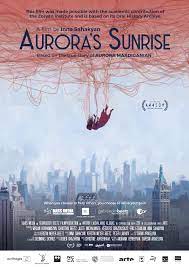
AURORA'S SUNRISE
Armenia/Germany/Lithuania, 2022, 96 minutes, Colour.
Anzhelika Hakoyyan.
Directed by Inna Sahakyan.
A very impressive film on various counts, both its content as well as its visual style.
The film tells the story of a young woman, Aurora Mardiganian, her family in Anatolia, 1915, working with materials and colours, threatened by the Turkish government, the beginning of the Armenian genocide and the consequences for her family, their deaths and her survival. Through a strange set of events, she was saved, was taken to St Petersburg where she set sail for the United States. On her arrival in the US, moving through Ellis Island, some entrepreneurs found her, persuaded her to tell her story, had it translated from Armenian into English, serialised it in the newspapers. She was hoping to find her brother who lived in the United States. An organisation for the saving of exiled Armenian children sponsored her.
This led to Hollywood, her appearing in the 2018 film, Auction of Souls, her travelling to promote the film until she collapsed and her entrepreneurs located her quietly in a convent while they found substitutes to continue the tour.
She left the convent, found the people in charge of the charity. After that, she lived a quiet life in the United States living into the latter part of the 20th century.
Most of the film is animated, a delicate style of animation, paper cutout computer graphics. This enables the story to be told in a range of detail, family life, the attack of the Turkish soldiers, aspects of the genocide, the trek through Europe, St Petersburg, and life in the United States, the making of the film and its promotion.
Most important also for the film is the fact that prints of Auction of Souls disappeared. However, some footage was discovered in the 1990s, 18 minutes from the film. And these minutes are inserted into this documentary, quite extraordinary footage of the genocide, crowd scenes, soldiers, brutality, exile. The insertion of these film sequences at various stages of the narrative are quite powerful, reminding audiences about the genocide – with a commentary that many nations eventually recognised the genocide, including the US in the 21st-century, and the fact that the Turkish government has denied it.
And, throughout the film, there is interview material with the elderly Aurora (her original Armenian name changed so that Americans could grasp it more easily). The interviews are very forthright, reminiscences, commentary on her feelings, and the desire for the Turkish government to acknowledge the truth.
Aurora’s Sunrise has won many awards internationally. It offers an opportunity for audiences to see aspects of the genocide dramatised soon after the events, as well as to appreciate the personal story of Aurora, a survival, escape, the film, American exploitation, her life.